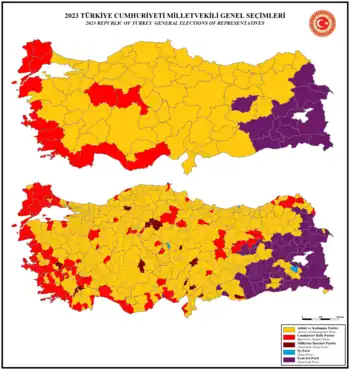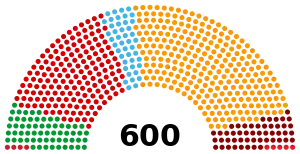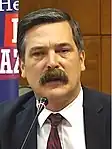| |||||||||||||||||||||||||||||||||||||||||||||||||||||||||||||||||||||||||||||||||||||||||||||||||||||||||||||||||||||||
All 600 seats in the Grand National Assembly 301 seats needed for a majority | |||||||||||||||||||||||||||||||||||||||||||||||||||||||||||||||||||||||||||||||||||||||||||||||||||||||||||||||||||||||
|---|---|---|---|---|---|---|---|---|---|---|---|---|---|---|---|---|---|---|---|---|---|---|---|---|---|---|---|---|---|---|---|---|---|---|---|---|---|---|---|---|---|---|---|---|---|---|---|---|---|---|---|---|---|---|---|---|---|---|---|---|---|---|---|---|---|---|---|---|---|---|---|---|---|---|---|---|---|---|---|---|---|---|---|---|---|---|---|---|---|---|---|---|---|---|---|---|---|---|---|---|---|---|---|---|---|---|---|---|---|---|---|---|---|---|---|---|---|---|---|
| Turnout | 87.05% ( | ||||||||||||||||||||||||||||||||||||||||||||||||||||||||||||||||||||||||||||||||||||||||||||||||||||||||||||||||||||||
| |||||||||||||||||||||||||||||||||||||||||||||||||||||||||||||||||||||||||||||||||||||||||||||||||||||||||||||||||||||||
  | |||||||||||||||||||||||||||||||||||||||||||||||||||||||||||||||||||||||||||||||||||||||||||||||||||||||||||||||||||||||
| |||||||||||||||||||||||||||||||||||||||||||||||||||||||||||||||||||||||||||||||||||||||||||||||||||||||||||||||||||||||
Parliamentary elections were held in Turkey on 14 May 2023, alongside presidential elections, to elect all 600 members of the Grand National Assembly. The incoming members formed the 28th Parliament of Turkey. The elections had originally been scheduled to take place on June 18, but the government moved them forward by a month to avoid coinciding with the university exams, the Hajj pilgrimage and the start of the summer holidays.[1] Prior to the election, the electoral threshold for a party to enter parliament was lowered from 10% to 7% by the ruling party.[2]
The elections were contested by a total of 24 political parties. Some parties decided to participate in the elections as part of an electoral alliance, many of which were formed for the previous 2018 election and had been expanded since. The governing Justice and Development Party (AKP) of incumbent President Recep Tayyip Erdoğan lead the People's Alliance, which also included the Nationalist Movement Party (MHP), the Great Union Party (BBP) and the New Welfare Party (YRP). The largest opposition alliance was headed by the main opposition Republican People's Party (CHP) and included five other parties. These included the Good Party (İYİ), the Felicity Party (SP), the Democrat Party (DP) and two other parties headed by former senior AKP politicians, namely the Democracy and Progress Party (DEVA) of former economy minister Ali Babacan and the Future Party (GP) of former Prime Minister Ahmet Davutoğlu. The pro-Kurdish Peoples' Democratic Party (HDP) opted to run on the lists of the Party of Greens and the Left Future (YSGP) in light of a potential closure case. The YSGP itself headed the left-wing Labour and Freedom Alliance along with the Workers' Party of Turkey (TİP). Two smaller alliances, the Ancestral Alliance of presidential candidate Sinan Oğan and the Union of Socialist Forces, also participated in the elections for the first time.[3]
The People's Alliance retained its majority in the parliament with 323 MPs. The AKP, led by incumbent president Erdoğan, won the highest percentage of the vote with 36%, though it suffered its worst result since 2002. MHP, the second largest party of the People's Alliance, outperformed expectations and won 10.1% of the votes. The alliance overall won just under 50% of the vote. The Nation Alliance only marginally improved on its 2018 vote, winning a combined 34% and 212 MPs. The Labour and Freedom Alliance suffered a decline in their vote, winning just over 10% and 66 seats. No other electoral alliance won seats. The election resulted in seven parties entering the parliament, which is a record in Turkish politics.
Many smaller parties ran on the lists of larger ones to avoid splitting the vote. Prior to the election, the CHP caused controversy by fielding 77 DEVA, Felicity Party, Future Party, and Democrat Party candidates on its own lists, of which 39 (14 DEVA, 10 Felicity, 10 Future, 3 Democrats, 1 IYI, and 1 Party for Change in Turkey) were elected — a significantly higher proportion than these parties' national share of support.[4] These included former AKP ministers such as Sadullah Ergin (running as a DEVA candidate), who was widely criticised for his role as Justice Minister in the Ergenekon conspiracy against the Turkish Armed Forces. The AKP, meanwhile, was criticised for fielding members of the Free Cause Party (HÜDA PAR), a party known for its ties to the Kurdish Hezbollah, as candidates.
Electoral system
The 600 members of the Grand National Assembly of Turkey will be elected by party-list proportional representation in 87 electoral districts, by the D'Hondt method. For the purpose of legislative elections, 77 of Turkey's 81 provinces serve as single districts. Due to their large populations, the provinces of Bursa and Izmir are divided into two districts, while the provinces of Ankara and Istanbul are each divided into three.[5]
According to the Constitution of Turkey, any amendment to the election law can only apply a year after it comes into effect.[6]
Lowering of the electoral threshold
At the initiative of the ruling AKP and its main political ally MHP, the national electoral threshold for a party to enter parliament was lowered from 10% to 7%.[7] This was the first lowering of the threshold since it was introduced by the military junta following the 1980 Turkish coup d'état.[8]
There is no threshold for independent candidates.[9] Political parties can also opt to contest the election in a political alliance with other parties, removing the 7% requirement as long as the alliance as a whole wins more than 7% of the vote in total.[10]
Other amendments to the election law includes the distribution of seats. Previously, parliamentary seats were distributed based on the vote share of each election alliance in any given district. Now, the seats are distributed based solely on the vote share of each political party in that district. If applied to the previous elections, the results would have been slightly more in line with the preferences of the voters on local level. For example, one Erzurum seat from IYI (4th largest party in Erzurum) would have gone to HDP (3rd largest party in Erzurum) and one Elazığ seat from CHP (3rd largest party in Elazığ) to MHP (2nd largest party in Elazığ).[11]
Electoral districts
Turkey is split into 87 electoral districts, which elect a certain number of Members to the Grand National Assembly of Turkey. The Assembly has a total of 600 seats, with each electoral district allocated a certain number of MPs in proportion to their population. The Supreme Electoral Council of Turkey conducts population reviews of each district before the election and can increase or decrease a district's number of seats according to their electorate.
In all but four cases, electoral districts share the same name and borders as the 81 provinces, with the exceptions being Ankara, Bursa, Izmir and Istanbul. Provinces electing between 19 and 36 MPs are split into two electoral districts, while any province electing above 36 MPs is divided into three. As the country's most populous provinces, Bursa and Izmir are divided into two subdistricts while Ankara and Istanbul are divided into three. The distribution of elected MPs per electoral district is shown below.[12]
|
|
|
|
| |||||||||||||||||||||||||||||||||||||||||||||||||||||||||||||||||||||||||||||||||||||||||||||||||||||||||||||||||||||||||||||||||||||||||||||||||||||||||||||||||||||||||||||||||||||||||||||||||||||||||||||||||||||||||||||||||||||||||||||||||||||||||||||||||||||||||||||||||||||||||||||||||||||||
Parties
For political parties to achieve (nationwide) ballot access, they must be eligible to meet the requirements set by Law no. 298 on "Basic Provisions on Elections and Electoral Registers".[13]
The Green Party, founded in September 2020, has been barred from the election by the Interior Ministry despite a court ruling against the ministry.[14][15] As of 2022 the establishment of the Humanity and Freedom Party had been awaiting the Constitutional Court for four years after the completion of the legal process.[16]
On 11 March 2023, the Supreme Election Council confirmed that 36 parties were eligible to run in the elections.[17]
Contesting parties
The table below shows the places of alliances, parties, and independent candidates in the order they appear on the ballot paper. However, the ballot paper is not the same in every electoral district as some parties do not participate in every electoral district or are on another party's list.
Other eligible parties
The below table shows the remaining parties that were eligible to contest the election but decided run on the lists of other parties or decided not to field candidates.
List of alliances
Opinion polls

Conduct
Political violence
During the election campaign, several occurrences that took place have been labelled as political violence. On 31 March 2023, the Istanbul headquarters of the Good Party was targeted in a shooting attack.[21] No one was harmed in the shooting. Akşener criticised Erdoğan after the attack by saying "A political party cannot be intimidated one and a half months before an election. We are not afraid. I fear nothing but God. Mr. Recep (Erdoğan), I am not afraid of you. But you are the president and you are responsible for every citizen in this country." The attackers were emboldened by the president's harsh words against the opposition, Akşener said.[22][23][24] Upon investigation, it became clear that a nighttime security guard had fired his gun at burglars – only to hit the building by mistake with two stray bullets. President Erdoğan said in response to Akşener "The truth has come out, are you now going to apologize to me?"[25]
Recent attacks on other parties have raised issues of political polarisation and security in the country.[26] On 1 May, a group of unidentified individuals armed with guns and sticks assaulted HUDAPAR youth members in Mersin. HUDAPAR was hosting an election campaign stand to help their electoral ally the AK Party. The HDP denied links to the attack, and urged its supporters to refrain against provocations.[27]
Results
 | |||||||
|---|---|---|---|---|---|---|---|
| Party or alliance | Votes | % | Seats | +/– | |||
| People's Alliance | Justice and Development Party | 19,187,170 | 35.56 | 268 | –27 | ||
| Nationalist Movement Party | 5,421,800 | 10.05 | 50 | +1 | |||
| New Welfare Party | 1,510,745 | 2.80 | 5 | New | |||
| Great Unity Party | 524,881 | 0.97 | 0 | –1 | |||
| Total | 26,935,107 | 49.91 | 323 | –21 | |||
| Nation Alliance | Republican People's Party | 13,675,902 | 25.34 | 169 | +23 | ||
| Good Party | 5,225,196 | 9.68 | 43 | 0 | |||
| Total | 19,078,164 | 35.35 | 212 | +23 | |||
| Labour and Freedom Alliance | Party of Greens and the Left Future | 4,800,607 | 8.90 | 61 | –4 | ||
| Workers' Party of Turkey | 954,547 | 1.77 | 4 | +2 | |||
| Total | 5,759,958 | 10.67 | 65 | –2 | |||
| Ancestral Alliance | Victory Party | 1,211,917 | 2.25 | 0 | New | ||
| Justice Party | 108,713 | 0.20 | 0 | 0 | |||
| Total | 1,325,635 | 2.46 | 0 | New | |||
| Homeland Party | 502,669 | 0.93 | 0 | New | |||
| Union of Socialist Forces | Left Party | 76,801 | 0.14 | 0 | 0 | ||
| Communist Party of Turkey | 62,826 | 0.12 | 0 | 0 | |||
| Communist Movement of Turkey | 17,222 | 0.03 | 0 | 0 | |||
| Total | 159,277 | 0.30 | 0 | New | |||
| Young Party | 112,972 | 0.21 | 0 | 0 | |||
| Motherland Party | 66,102 | 0.12 | 0 | 0 | |||
| Patriotic Party | 52,720 | 0.10 | 0 | 0 | |||
| Nation Party | 52,314 | 0.10 | 0 | 0 | |||
| Rights and Freedoms Party | 42,509 | 0.08 | 0 | 0 | |||
| Justice Unity Party | 41,207 | 0.08 | 0 | New | |||
| People's Liberation Party | 31,831 | 0.06 | 0 | 0 | |||
| Power Union Party | 26,359 | 0.05 | 0 | New | |||
| National Road Party | 17,758 | 0.03 | 0 | New | |||
| Innovation Party | 11,171 | 0.02 | 0 | New | |||
| Independents | 226,831 | 0.42 | 0 | 0 | |||
| Total | 53,962,770 | 100.00 | 600 | 0 | |||
| Valid votes | 53,962,770 | 97.48 | |||||
| Invalid/blank votes | 1,393,311 | 2.52 | |||||
| Total votes | 55,356,081 | 100.00 | |||||
| Registered voters/turnout | 64,145,504 | 87.05 | |||||
| Source: YSK | |||||||
Notes
- ↑ As Peoples' Democratic Party (HDP). The full HDP list won 67 seats, of which two were taken by the Workers' Party of Turkey which contested the 2023 elections separately). Anticipating a ban from the closure case result, the HDP announced on 23 March that it would contest the vote under the allied Green Left party's ticket.
- ↑ Republican People's Party will run under Good Party list in 7 provinces[20]
- ↑ Good Party will run under Republican People's Party list in 9 provinces[20]
- 1 2 3 4 Participates in elections within the Republican People's Party
- 1 2 3 4 Participates in elections within the Party of Greens and the Left Future
- ↑ Participates in elections within the Workers' Party of Turkey
References
- ↑ "Erdogan calls Turkish elections for May 14, three months after quake disaster". Reuters. 10 March 2023. Retrieved 19 May 2023.
- ↑ "Turkey reduces election threshold to 7 percent - Türkiye News". Hürriyet Daily News. 1 April 2022. Retrieved 19 May 2023.
- ↑ Gadzhiev, Amur (19 April 2023). "Turkey on the Eve of Presidential and Parliamentary Elections: Balance of Political Forces in the Country". russiancouncil.ru. Retrieved 19 May 2023.
- ↑ "Millet İttifakı partilerinden 39 aday, CHP listesinden Meclis'e girdi". www.ntv.com.tr (in Turkish). Retrieved 7 October 2023.
- ↑ "How Turkey's Parliamentary Elections Work". carnegieeurope.eu. 26 October 2015. Retrieved 19 May 2023.
- ↑ "Turkey: Parliament Passes Law Amending Election Laws and Lowering Electoral Threshold". Library of Congress, Washington, D.C. 20540 USA. Retrieved 19 May 2023.
- ↑ Minute, Turkish (April 2022). "Turkey reduces its election threshold from 10 to 7 percent - Turkish Minute". Retrieved 2 April 2022.
- ↑ "Turkey lowers party' election threshold for parliament to 7 pct". www.xinhuanet.com. 1 April 2022. Retrieved 2 April 2022.
- ↑ "Crossing the threshold – the Turkish election". www.electoral-reform.org.uk. Retrieved 3 March 2020.
- ↑ "Yeni seçim yasası ve ittifaklar: Kritik değişiklikler!". www.ntv.com.tr (in Turkish). 3 April 2023. Retrieved 19 May 2023.
- ↑ Sarıkaya, Muharrem (15 March 2022). "İttifakın ayrıcalığı kalmayacak". www.haberturk.com (in Turkish). Retrieved 2 April 2022.
- ↑ "Yüksek Seçim Kurulunun 02/03/2023 Tarihli ve 71 Sayılı Kararı" (PDF). Official Gazette of the Republic of Turkey. No. 32121. 3 March 2023. Retrieved 24 March 2023.
- ↑ "Turkey's Supreme Election Council finds 24 political parties eligible to enter elections". Bianet. Retrieved 9 April 2022.
- ↑ Büro, Ankara (9 December 2022). "Yeşiller Partisi yine kurulamadı: Partiye dijital engel". Medyascope (in Turkish). Retrieved 11 March 2023.
- ↑ ERGİN, Sedat (18 March 2023). "Mahkeme, Yeşiller ile İçişleri Bakanlığı arasındaki kritik davada kimi haklı buldu?". www.hurriyet.com.tr (in Turkish). Retrieved 18 March 2023.
- ↑ "Türkiye 2022 Report". EU Delegation to Türkiye. Retrieved 13 January 2023.
- ↑ "Yüksek Seçim Kurulu son dakika olarak duyurdu: Seçime 36 siyasi parti katılacak". 11 March 2023. Retrieved 11 March 2023.
- ↑ "Büyük Türkiye Partisi seçimlerden çekiliyor: Ülkemizi rahatsız eden görüntüler var". TGRT Haber. 12 April 2023. Retrieved 14 April 2023.
- ↑ "BTP Genel Başkanı Baş: Seçime katılmama kararı aldık". SoL Haber. 10 April 2023.
- 1 2 "CHP ve İYİ Parti 16 ilde ortak adayla seçime girecek" (in Turkish). 9 April 2023.
- ↑ "Son Dakika: İYİ Parti İstanbul İl Başkanlığı'na silahlı saldırı". www.cumhuriyet.com.tr (in Turkish). 31 March 2023. Archived from the original on 31 March 2023. Retrieved 31 March 2023.
- ↑ ""I am not afraid, Mr. Recep!"". Gercek News. 31 March 2023. Archived from the original on 31 March 2023. Retrieved 31 March 2023.
- ↑ "Son Dakika: Meral Akşener İl Başkanlığı'nda... Beklenen açıklama geldi". www.cumhuriyet.com.tr (in Turkish). 31 March 2023. Archived from the original on 31 March 2023. Retrieved 31 March 2023.
- ↑ "Opposition blames President Erdogan after election build-up turns violent". Al Arabiya English. Istanbul. 2 April 2023. Archived from the original on 2 April 2023. Retrieved 2 April 2023.
- ↑ "Cumhurbaşkanı Erdoğan'dan Akşener'e kurşun tepkisi: Gerçek ortaya çıktı, özür dileyecek misin?". www.ntv.com.tr (in Turkish). 2 April 2023. Retrieved 2 April 2023.
- ↑ "Armed attack on AKP office in Adana". Bianet. 21 April 2023. Archived from the original on 23 April 2023. Retrieved 1 May 2023.
- ↑ "Mersin'de HÜDAPAR standına saldırı, HDP açıklama yaptı". Rudaw (in Turkish). 1 May 2023.

.png.webp)

.jpg.webp)
_(cropped).jpg.webp)
.jpg.webp)
